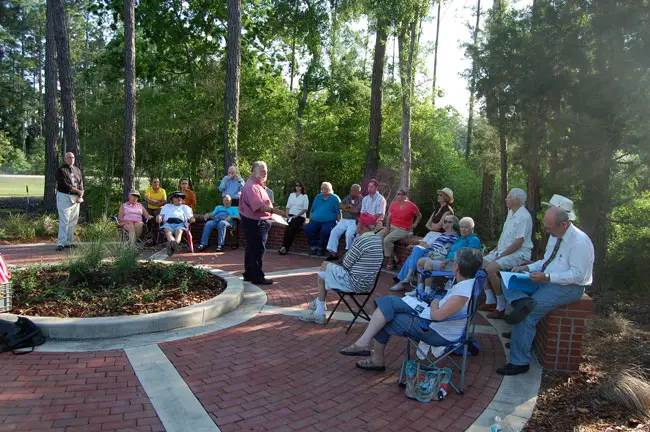
Harry Truman made history in 1952 when he scaled the constitutional wall separating church and state with a proclamation declaring that year’s Independence Day a National Day of Prayer “on which the people of the United States may turn to God in prayer and meditation.” Congress and Ronald Reagan italicized that history in 1988 when one passed and the other signed into law the requirement that every president designate the first Thursday of May a national day of prayer (hence President Obama’s proclamation last week “to pray, or otherwise give thanks.”)
On Thursday, Palm Coast made history of its own as a modest but pious believers in the church-state wall gathered at Heroes Park to celebrate the nation’s first Day of Inclusivity.
They assembled under the auspices of Americans United for the Separation of Church and State, the half-century-old organization whose national board chairman, Merrill Shapiro, is a Palm coast resident and the organizer of the Day of Inclusivity. They opened with the Star Spangled Banner, closed with My Country ‘Tis of Thee, and in between listened to several speakers’ reflections on prayer’s nobility, the many varieties of religious experiences and even prayer’s necessity for many–as long as government wasn’t imposing or sponsoring any of it.
Click On:
- Flagler “Day of Inclusivity” Answers National Day of Prayer
- Read Judge Crabb’s Opinion Declaring the Day of Prayer Unconstitutional
- Barack Obama’s Day of Prayer Proclamation
- Harry Truman’s 1952 Proclamation
- Americans United for Separation of Church and State
- National Day of Prayer Task Force
- Jefferson’s Separation of Church and State Letter (1802)
- George W. Bush’s Jesus Day Proclamation
Intended as the first in an annual counterpoint to the national day of prayer–should that day continue in contravention to a federal judge’s ruling, in April 2010, that the day as officially proclaimed is unconstitutional–the Day of Inclusivity, Shapiro said, is an attempt to push back and “maintain the integrity of that wall and maintain the separation of church and state just as our founders intended.”
George Griffin, head of the regional head of the American Civil Liberties Union, gave a brief review of the many cases the ACLU has taken on protecting public places from religion–and protecting religious expression from government or non-governmental interference. (See a list of such cases here.) For all that, the ACLU remains a favored target of religious-right assumptions that the ACLU is a compulsive apostate in a land of ardent Christians.
Among Griffin’s examples of government’s overreach of not only religious, but expressly Christian, endorsements, was Jesus Day, so declared by George W. Bush in his latter-day governorship of Texas. “Mr. Bush, who has put his Christian faith front and center in the campaign, has tried to project an image of inclusiveness to people of all ethnicities and religions,” the Dallas Morning News reported three days after Bush was nominated for president in Philadelphia’s GOP convention. “In the past, he has been put on the defensive for saying that the only way to heaven was through Christ, and for naming Jesus as his favorite political philosopher.” The Bush years would prove among the most damaging to the church-state wall, beginning with–among Bush’s very first acts as president–the establishment by executive order of the Office of Faith-Based Initiatives.
“The part that scares me most,” Griffin concluded, “is that we let this happen.”
He was followed by Morris Sekiyo Sullivan of the Volusia Buddhist Fellowship. Sullivan spoke movingly of the Buddhist interpretation of prayer as a notion centered more on opening a door to self-discovery than ringing any given deity’s doorbell and hoping for an answer. Sullivan ended on a collective meditation. FlaglerLive Editor Pierre Tristam spoke as well, though not quite as memorably.
The audience was small, perhaps 20 people. It included Patrick Kelly, host of WNZF radio’s and chairman of the Flagler County Chamber of Commerce. He was there not as a representative of the chamber or so much in solidarity with the congregation than as “a social and political observer and commentator.”
“When it came to fulfilling the promise of ‘inclusion,’ I personally felt that at just three moments during the event: the singing of the two songs, and during the time when the Buddhist gentleman spoke,” Kelly, referring to Sullivan, wrote in an email. “His focus was on the things that create bonds between us rather than the differences that often divide us. I truly feel that he was the only one that spoke entirely in the spirit that is implied by the word ‘inclusion.'” Kelly, who disputes evidence of the Founders as secularists, observed one family that had joined the inclusivity group at one point, only to retreat back to Heroes Park’s flagpole, hold hands, and pray there.






























Leave a Reply